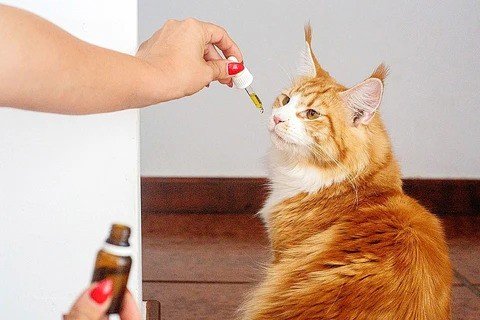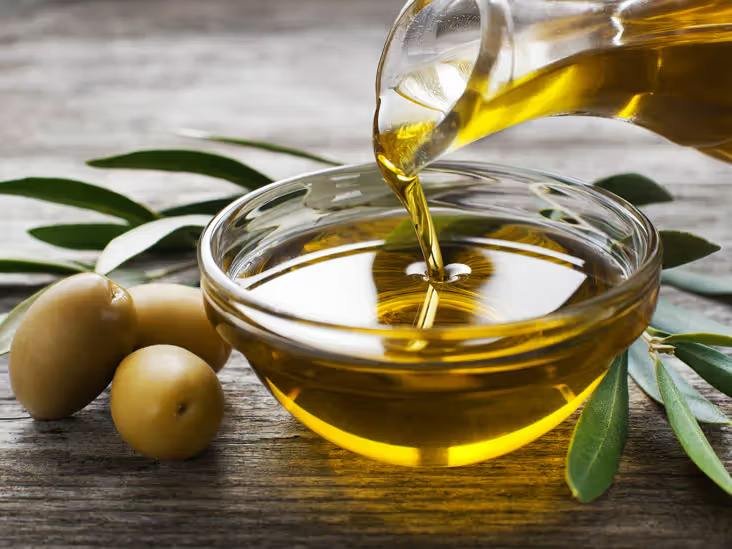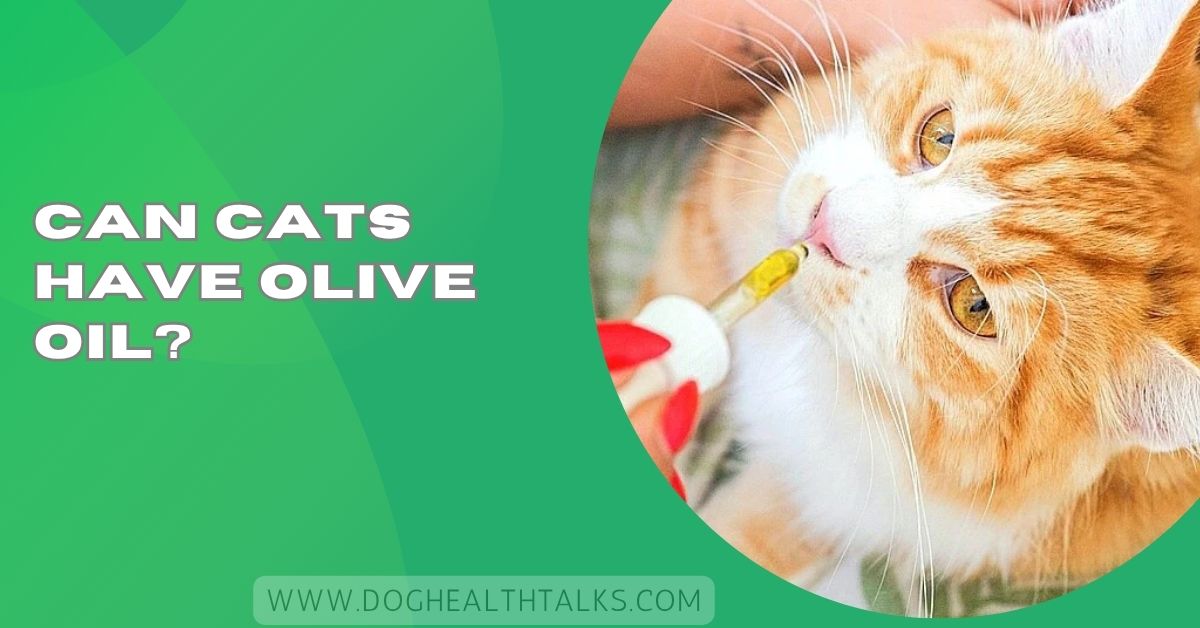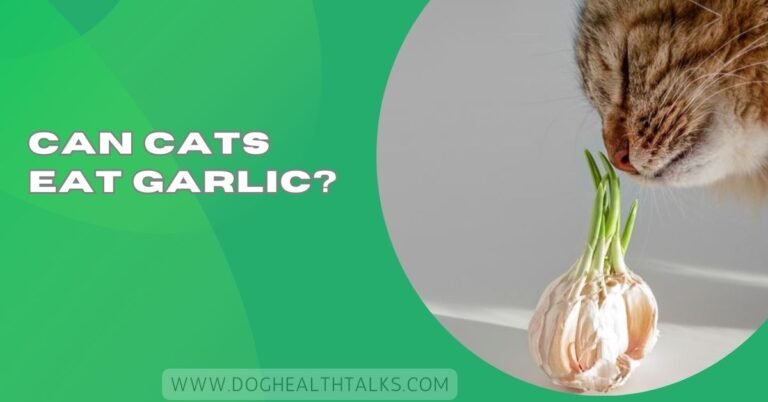Can Cats Have Olive Oil? – How to Use It Safely at Home!
Cats are curious by nature — especially when it comes to what we eat. If you’ve ever caught your feline friend sniffing your salad or licking a drop of olive oil, you may wonder: Can cats have olive oil safely?
Yes, cats can have olive oil in small amounts. It’s not poisonous or toxic, but too much can cause stomach upset or weight gain. Always use pure extra virgin olive oil sparingly.
In this guide, we’ll explore everything you need to know about olive oil for cats — including benefits, risks, dosage, and safe ways to use it.
Is Olive Oil Safe for Cats?
Yes, olive oil is generally safe for most healthy adult cats in moderation. It’s made from pressed olives and contains mostly monounsaturated fats, which are the “good” fats that can help with coat and skin health. However, cats are obligate carnivores — they get their essential nutrients from animal-based fats and proteins, not plants.
So, while a tiny bit of olive oil won’t harm your cat, it’s not an essential part of their diet either. Overusing it can lead to digestive problems, obesity, and even pancreatitis.
Why Some Cats Love Olive Oil

If your cat seems obsessed with olive oil, don’t worry — it’s not uncommon. Olive oil contains a natural compound called oleuropein, which is also found in olive leaves. This substance can produce a mild, catnip-like reaction in some felines. They might rub against the bottle, lick spilled drops, or act excited.
However, this fascination doesn’t mean they should consume much of it. The effect is behavioral rather than nutritional — so treat it as curiosity, not an invitation to share.
Potential Benefits of Olive Oil for Cats
While olive oil shouldn’t replace a cat’s regular diet, there are a few potential benefits when used sparingly and correctly:
1. Promotes a Shiny Coat and Healthy Skin
Olive oil is rich in vitamin E and healthy fats, which can help improve your cat’s coat and reduce dryness. Some owners add a few drops to food or use it topically on small dry patches (with vet approval).
2. Aids Mild Constipation
For cats that occasionally struggle with constipation, a few drops of olive oil can help soften stools. It acts as a gentle lubricant in the digestive tract. However, frequent constipation could signal a deeper issue — always talk to your vet first.
Also Read: Can Cats Eat Marmite?: Risks, Benefits, and Expert Advice!
3. Improves Appetite
Picky eaters sometimes find olive oil appealing because of its smooth texture and aroma. Adding a tiny drizzle to food might make it more enticing — but don’t make it a daily habit.
4. Provides Antioxidants
Olive oil contains antioxidants like polyphenols, which can support overall cellular health. Though cats don’t need plant-based antioxidants as much as humans, small doses may offer minor wellness benefits.
Potential Risks of Olive Oil for Cats
Despite its healthy image for humans, olive oil has more risks than benefits for cats if used carelessly.
1. Digestive Upset
The most common issue is diarrhea or vomiting. Cats’ stomachs aren’t designed for oily foods, and even a teaspoon may be too much for small cats.
2. Weight Gain
Olive oil is calorie-dense — one tablespoon has about 120 calories and 14 grams of fat. Over time, extra calories from fats can cause obesity, especially in indoor cats with less exercise.
3. Pancreatitis
High-fat foods, including oils, can trigger or worsen pancreatitis, an inflammatory condition of the pancreas that’s painful and potentially life-threatening. Cats with a history of this condition should never consume olive oil.
4. Nutrient Imbalance
Olive oil lacks essential fatty acids like omega-3 and omega-6, which cats require from animal sources such as fish oil or poultry fat. Relying on olive oil could lead to imbalances over time.
5. Toxic Additives
Never give your cat flavored or infused olive oils — such as garlic, chili, onion, or herb varieties. These ingredients are toxic to cats, even in trace amounts.
How Much Olive Oil Can a Cat Have? (Dosage Guidelines)
If your vet approves using olive oil for a specific reason — like occasional constipation or coat care — keep the dose extremely small:
| Cat Weight | Maximum Amount | Frequency |
| Under 4 kg (8 lbs) | ¼ teaspoon | Once a week or less |
| 4–6 kg (9–13 lbs) | ½ teaspoon | Once a week or less |
| Over 6 kg (14+ lbs) | ½–¾ teaspoon | Once a week or less |
Important tips:
- Always use extra virgin olive oil (EVOO) — it’s the purest form with no chemicals or preservatives.
- Mix it into your cat’s regular wet food, never give it straight from a spoon.
- Avoid heating or cooking the oil for your cat — raw, cold-pressed oil is safer and retains nutrients.
- If your cat vomits, has diarrhea, or shows lethargy after ingestion, stop immediately and call your vet.
Must Read: Can Dogs Eat Taro? – Don’t Miss This Expert Advice!
Alternatives to Olive Oil for Coat Health or Constipation

If you’re thinking about using olive oil to help your cat’s coat or digestion, there are better alternatives recommended by veterinarians:
- Fish Oil (Salmon or Sardine Oil): Contains omega-3 fatty acids (EPA and DHA) essential for skin, coat, and joint health.
- Coconut Oil (Tiny Amounts): Can help some cats with mild constipation, but also high in fat — use sparingly.
- Pumpkin Puree: A fiber-rich, vet-approved natural remedy for mild constipation.
- Hydration & Balanced Diet: The best long-term solution for skin, coat, and digestion issues.
These options are more species-appropriate and provide specific nutrients cats actually need.
When to Talk to Your Vet
Always consult your veterinarian before introducing olive oil or any supplement to your cat’s diet — especially if your cat has:
- Digestive problems
- Obesity
- Diabetes
- Pancreatitis
- Food allergies or sensitivities
If you’re using olive oil for constipation and your cat still hasn’t passed stool within 24 hours, contact your vet immediately. Prolonged constipation could indicate intestinal blockage or other serious issues.
How to Use Olive Oil Safely
If your vet approves olive oil for your cat, follow these safe use tips:
- Use high-quality extra virgin olive oil (cold-pressed, no additives).
- Introduce it gradually — a drop or two first time.
- Mix into food, don’t feed directly.
- Use occasionally, not as a daily supplement.
- Store oil in a cool, dark place to prevent spoilage.
Consistency and moderation are key. Olive oil should be seen as an occasional aid, not a dietary staple.
The Science Behind It
Studies on feline nutrition confirm that cats thrive on animal-derived fats rather than plant oils. Olive oil provides energy but lacks taurine, arachidonic acid, and other nutrients cats can’t synthesize on their own.
In one small study, about 24% of cats consumed olive oil during tests involving olive extracts, showing that some are naturally curious about its flavor — but no proven long-term benefits were observed. Most veterinarians agree: the potential digestive risks outweigh the minimal advantages.
Can Cats Have Olive Oil Tuna
Cats can eat tuna mixed with a few drops of olive oil, but only occasionally. Too much tuna or oil can upset their stomach and cause weight gain, so keep portions small.
Read More: Can Dogs Eat Corn Chips? The Risks Every Owner Should Know
Is Olive Oil Safe For Cats Skin
Yes, olive oil can help dry or flaky cat skin when used sparingly. Gently rub a small drop on affected areas, but avoid overuse or letting your cat lick too much.
Can Cats Have Butter
Butter isn’t toxic, but it’s not good for cats. Most cats are lactose intolerant, and butter’s high fat can cause diarrhea or stomach upset. It’s best to avoid giving butter.
Can I Give My Cat Olive Oil For Hairballs
Yes, a few drops may help hairballs pass more easily, but don’t use it often. Too much olive oil can upset your cat’s stomach. Ask your vet before giving it.
Can I Give My Cat Olive Oil For Constipation
A small amount of olive oil can help mild constipation by softening stool. Only use ¼ teaspoon once in a while and make sure your cat drinks enough water.
Can Cats Have Canola Oil
Cats can have tiny amounts of canola oil safely, but olive or fish oil is healthier. Canola oil has fewer nutrients cats need, so it’s best used only in moderation.
Can You Put Olive Oil On Cats’ Fur?
Yes, you can gently rub a small drop of olive oil on your cat’s fur to reduce dryness. Don’t overuse it, and make sure your cat doesn’t lick too much.
How Much Is Too Much Olive Oil For A Cat?
More than half a teaspoon can upset a cat’s stomach. Always use just a few drops occasionally, as too much olive oil can cause diarrhea, vomiting, or weight gain.
Is Olive Oil Good For Cats With Digestive Or Bowel Issues?
A few drops of olive oil can help mild constipation by softening stool. But for serious digestive issues, always ask a vet before using it as a remedy.
Olive Oil For Cats With Dandruff And Skin Problems
Olive oil can help reduce dandruff and dry skin when used sparingly. Apply a tiny amount on the coat or mix a few drops into food once a week.
Is Olive Oil Good For A Diabetic Cat?
Olive oil isn’t harmful, but diabetic cats need strict diets. Too much fat can raise calories and affect blood sugar levels. Always check with your vet before giving any oil.
Olive Oil Is A Hack, Not A Solution
Olive oil can offer quick relief for minor issues like dry skin or constipation, but it’s not a cure. Long-term health always depends on a balanced, vet-approved cat diet.
FAQs
What oils are safe for cats to eat?
Cats can safely have small amounts of olive, fish, or coconut oil, but only occasionally and in moderation.
How much olive oil to feed a cat?
Give just a few drops or up to ¼ teaspoon occasionally. Too much olive oil can upset your cat’s stomach.
Should I add oil to my cat’s food?
You can add a tiny amount occasionally, but always ask your vet first. Too much oil may cause stomach issues.
Can cats have coconut oil or olive oil?
Yes, both are safe in small amounts. Olive oil helps skin; coconut oil may ease constipation. Use sparingly.
Can cats eat food cooked with oil?
It’s better not to. Cooked oils lose nutrients and add unnecessary fat, which can cause digestive problems in cats.
Should I pour olive oil into my cat’s water dish?
No, never add oil to water. Cats may stop drinking it, leading to dehydration and other health problems.
Is putting olive oil on cat food safe and beneficial?
A few drops on cat food can help coat health, but use rarely to avoid stomach upset or extra calories.
Is using olive oil on cat food a good idea?
It’s okay sometimes, but not daily. Use extra virgin olive oil and give only a few drops at a time.
Is tuna in olive oil okay for cats?
Yes, in small portions. Too much tuna or oil can cause stomach upset or weight gain in cats.
Why do cats like olive oil? Is it safe for them to lick?
Cats enjoy olive oil’s smell and taste. Licking a small amount is safe, but large amounts can upset their stomach.
Conclusion
So, can cats have olive oil? Yes — but only in tiny amounts and occasionally. While it’s not toxic, it offers limited benefits and can easily cause stomach upset or weight gain if overused.
If your goal is to help your cat’s coat, digestion, or appetite, talk to your vet about safer, species-specific options like fish oil or fiber supplements. Always prioritize a balanced, protein-rich diet designed for feline health.
Olive oil can be a harmless treat every once in a while — but your cat’s best health still comes from what nature intended: meat, hydration, and plenty of love.






